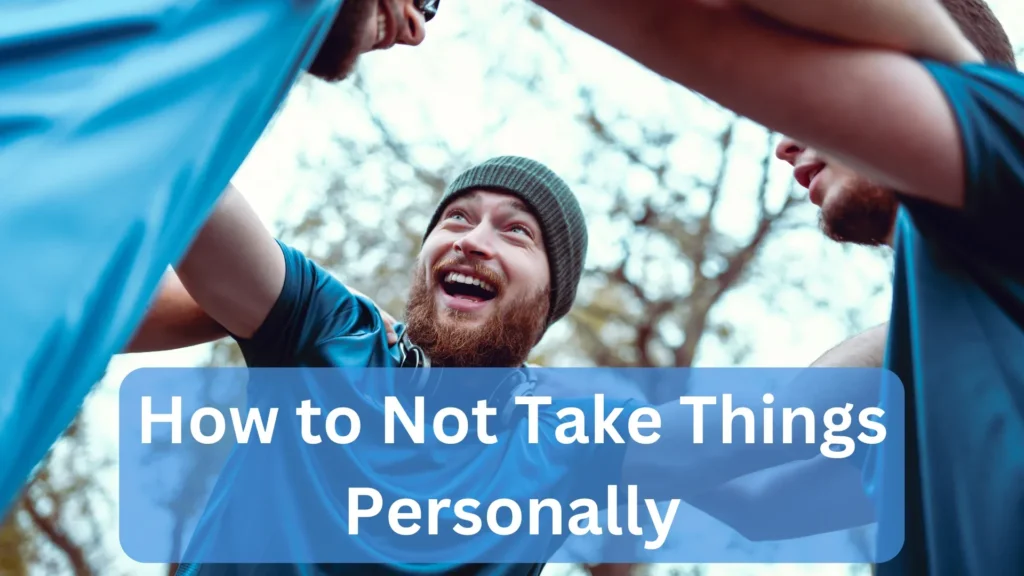
Hey there! Let’s dive into how to not take things personally, especially when the stakes feel high, like in sports.
Do you take things too personally? Here’s how you know
Ever find yourself stewing over a comment from a coach or a teammate long after the game?
If every critique feels like a personal jab or if you’re constantly ruminating on a missed play, chances are you’re taking things too personally and you might be too sensitive.
Recognizing this is the first step toward making a change.
Here are a few more signs:
Do you often feel singled out, even when feedback is given to the whole team?
Or maybe you’re quick to blame yourself when things don’t go as planned, carrying that weight even into your next performance.
It’s also telling if you struggle to accept jokes or light-hearted comments from teammates, interpreting them as hidden criticisms.
These reactions can not only affect your game but also how you feel on and off the field.
Identifying these patterns is crucial for turning things around.
Why do we take things too personally?
It’s pretty common in sports to feel like every piece of feedback is a direct assault on your skills.
Often, it’s about our deep-seated need to be accepted and the fear of being seen as less than capable.
Understanding this can be a game-changer in how we perceive feedback and setbacks.
We also tend to take things personally because of our previous experiences and emotional sensitivities, which can color how we interpret interactions.
For instance, if you’ve ever been criticized harshly in the past, you might be more sensitive to even constructive feedback now.
Another factor is our self-esteem.
Those with lower self-esteem may be more prone to viewing neutral or negative comments as personal attacks.
Additionally, the competitive nature of sports amplifies these feelings, as athletes are often under intense pressure to perform and fear losing their spot or letting the team down.
Recognizing these underlying reasons can help athletes manage their reactions more effectively.
How to stop taking things too personally and getting upset
Alright, how to not take things personally?
Start by separating your feelings from facts.
Just because a coach points out a mistake doesn’t mean they think you’re bad at your sport.
It’s usually about the play, not the player.
Also, keep the big picture in mind!
A single error or harsh word doesn’t define your whole career or your worth.
Learn to shake it off and focus on the next opportunity.
Alright, how to not take things personally?
To further help you manage your reactions, practice setting emotional boundaries.
Recognize that you have control over how you respond to feedback and criticism.
Instead of instantly reacting, take a moment to process what’s been said.
Maybe even ask for clarification to avoid misunderstandings that might lead to taking things personally.
Developing a growth mindset is another powerful tool.
This means seeing challenges, setbacks, and even criticisms as opportunities to grow and learn, not as reflections of your inherent abilities or worth.
Embrace the idea that proficiency in any skill, including emotional resilience, comes with practice and perseverance.
Additionally, regularly engage in self-reflection.
Ask yourself, “Why does this particular comment bother me?”
Understanding your triggers can make them easier to manage.
If you find that specific types of feedback or certain situations consistently upset you, discuss this with a mentor or psychologist.
They can provide strategies tailored to your personal experiences and emotional responses.
Lastly, surround yourself with supportive people.
A supportive environment can help buffer the impact of negative experiences.
When you feel secure and valued, it’s easier to view criticism constructively instead of personally.
Building resilience on and off the field
Resilience is key in sports!
The ability to bounce back from setbacks without taking things personally is what separates good athletes from great ones.
Work on your mental game by practicing mindfulness or engaging in visualization techniques.
This helps in managing emotions and staying focused under pressure.
Expanding on these techniques, consider incorporating regular resilience training into your routine, similar to physical training sessions.
Activities like yoga, controlled breathing exercises, and even meditation can strengthen your mental stamina.
These practices help you stay calm and collected during high-stress moments in a game.
Additionally, setting realistic, achievable goals can significantly boost your resilience.
When goals are clearly defined, you’re more likely to see setbacks as temporary obstacles rather than devastating failures.
Celebrate small victories along the way to build confidence and a sense of progress, which are critical for maintaining motivation and perspective.
Learning to communicate effectively is also crucial for resilience.
Being able to express your feelings and needs clearly to coaches and teammates can prevent misunderstandings and reduce feelings of isolation or resentment.
Effective communication helps build a support network that’s vital for resilience.
Finally, actively seek feedback and use it constructively.
Engage in open conversations with your coaches about your performance.
Ask for specific advice on how to improve and clarify any points of confusion.
Understanding that feedback is a tool for improvement, not criticism, can change your entire approach to receiving it, helping you bounce back quicker and with more confidence.

Examples of how not to take things personally on the field
Imagine a soccer player who misses a penalty kick.
Instead of beating themselves up, they quickly acknowledge the mistake, learn what can be improved, and mentally prepare for the next opportunity.
They understand it’s not a reflection of their entire skill set.
That’s how to not take things personally.
Imagine a soccer player who misses a penalty kick.
Instead of beating themselves up, they quickly acknowledge the mistake, learn what can be improved, and mentally prepare for the next opportunity.
They understand it’s not a reflection of their entire skill set. That’s how to not take things personally.
A basketball player might get benched during a crucial part of the game.
Rather than sulking or feeling targeted by the coach, they can choose to support their team from the sidelines, staying engaged and ready to contribute when called upon again.
This shows maturity and team spirit, critical components of not taking things personally.
In another scenario, a baseball player might misinterpret a teammate’s frustrated comment after a missed play as a personal attack.
Instead of responding defensively or harboring resentment, the player could approach the teammate after the game to discuss the comment calmly.
This can often reveal that the frustration was about the situation, not the individual, clearing up any misunderstandings and strengthening team cohesion.
A tennis player who loses a match might typically dwell on negative self-judgment.
By shifting focus from personal failings to specific technical aspects that could be improved, the player transforms personal criticism into constructive critique.
This approach not only enhances skills but also preserves mental health.
Additionally, a runner at a track meet who overhears a rival commenting on their last performance could choose to interpret the words as motivational rather than demeaning.
This re-framing can convert potentially hurtful comments into fuel to push harder and prove their capability through performance, not confrontation.
These examples illustrate how athletes can apply mental reframing techniques, clear communication, and a focus on growth to effectively learn how to not take things personally in competitive sports environments.
Turning feedback into fuel
Another tip on how to not take things personally is to see feedback as fuel for growth.
Instead of getting defensive, ask questions like, “What can I learn from this?” or “How can I use this to get better?”
It turns potentially upsetting situations into chances for improvement.
To further harness the power of feedback, start by acknowledging that everyone, even top performers, has room for improvement.
Approach each piece of feedback with curiosity rather than fear.
For instance, if a coach suggests adjusting your technique, experiment with their advice during practice to see if it enhances your performance.
This proactive approach shows a commitment to excellence and resilience.
Maintain a feedback journal where you can note down significant comments and your responses to them.
Regularly review this journal to assess your progress and remind yourself of how far you’ve come.
This not only keeps you motivated but also puts feedback into perspective as part of your growth journey, not as criticism of your current abilities.
Developing a routine for immediate reflection after receiving feedback can also be beneficial.
Take a moment to breathe and think through the feedback before reacting.
This can help in de-escalating any initial emotional response and allows for a more rational and productive approach to using feedback constructively.
Lastly, discuss feedback with trusted teammates or mentors.
They can offer additional insights, suggest different interpretations, or share how they’ve handled similar feedback.
This network of support not only helps in refining your skills but also reinforces the collective aspect of growth and improvement in sports.
By transforming feedback into a collaborative learning experience, it becomes less about personal shortcomings and more about collective advancement.
Keeping it cool with teammates
Sometimes, the heat of the moment can make us snap at teammates or take their in-game frustrations personally.
Remember, everyone’s trying to win and might be under their own pressure.
Communicate openly instead of holding grudges.
This helps maintain a positive team dynamic and personal peace of mind.
Sometimes, the heat of the moment can make us snap at teammates or take their in-game frustrations personally.
Remember, everyone’s trying to win and might be under their own pressure.
Communicate openly instead of holding grudges.
This helps maintain a positive team dynamic and personal peace of mind.
To further enhance your team interactions, practice active listening.
When a teammate is speaking, focus fully on understanding their point of view without immediately planning your response.
This shows respect and can help de-escalate potential conflicts before they worsen.
Establish regular team meetings or debrief sessions where everyone can speak openly and constructively about the game, individual performances, and any tensions that arose.
This structured approach to communication prevents misunderstandings and builds a foundation of trust.
Encourage a culture of mutual support and positivity.
Celebrate your teammates’ successes as enthusiastically as you would your own.
This not only boosts team morale but also creates an environment where it’s easier to give and receive feedback without taking things personally.
If tensions do rise, consider implementing conflict resolution strategies like mediation or bringing in a coach or counselor to facilitate discussions.
These strategies can help clear the air and ensure that all team members feel heard and valued.
By fostering a supportive team environment, you’ll find it much easier to keep cool with teammates, reducing the chances of taking comments personally and increasing the overall cohesion and performance of the team.
Conclusion
Alright, wrapping this up!
Learning how to not take things personally is crucial in sports and beyond.
It’s all about perspective, resilience, and the willingness to grow from every experience.
The more you practice, the better you’ll get at bouncing back fast and keeping your head in the game.
Need a little extra boost?
Check out our Success Stories Community.
It’s where you can get support from me, your friendly neighborhood sports psychologist.
Plus, you’ll meet loads of like-minded folks all geared towards achieving top performance.
We’ve got tons of resources to help you excel.
So, what’s holding you back?
Dive into our community and start turning every piece of feedback into your stepping stone to success.
Let’s make those setbacks your launchpad!



